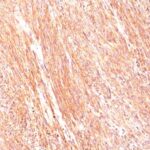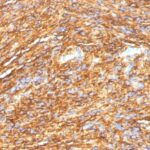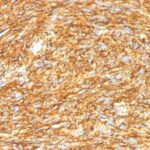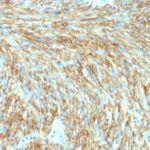Human Anti-DOG-1 / TMEM16A Antibody Product Attributes
Species: Human
Tested Applications: Immunohistochemistry (IHC).
Clonality: Monoclonal
Anti-DOG-1 / TMEM16A Antibody Clone: DG1/1486
Clone DG1/1486 Host and Isotype: Mouse IgG2b kappa
Anti-Human DOG-1 / TMEM16A Positive Control Sample: Gastrointestinal Stromal Tumor (GIST) or testicular germ cell tumor. Melanocytes in the basal layer of the epidermis and mast cells in the dermis of normal skin.
Cellular Localization of Antibody Cell Surface and Cytoplasm
Buffer and Stabilizer: 10mM PBS with 0.05% BSA and 0.05% Azide
Antibody Concentration: 200 ug/ml
Antibody Purification Method:Protein A/G Purified
Immunogen: Recombinant human DOG-1 protein fragment (aa 2-101)
Storage Conditions: Store at 2 to 8° C (refrigerate). Stable for 24 months when properly stored.
DOG-1 / TMEM16A Previously Observed Antibody Staining Patterns
| DOG-1 / TMEM16A General Information | |
|---|---|
| Alternate Names | |
| Transmembrane member 16A, TMEM16A, Canine1, Anoctamin-1, ANO1 | |
| Molecular Weight | |
| 114kDa | |
| Chromosomal Location | |
| 11q13.3 | |
| Curated Database and Bioinformatic Data | |
| Gene Symbol | TMEM16A |
| Entrez Gene ID | 55107 |
| Ensemble Gene ID | ENSG00000131620 |
| RefSeq Protein Accession(s) | XP_006718665, XP_006718668, XP_011543433, XP_011543425, XP_011543426, XP_011543431, XP_011543423, XP_016873445, XP_016873446, XP_006718667, XP_011543430, XP_011543427, XP_011543429, NP_060513, XP_011543428 |
| RefSeq mRNA Accession(s) | XM_011545121, XM_011545128, NR_030691, XM_011545124, XM_011545131, XM_006718602, XM_011545123, XM_011545126, XM_011545127, XM_006718604, XM_011545129, XM_017017957, NM_018043, XM_006718605, XM_011545125, XM_017017956 |
| RefSeq Genomic Accession(s) | NC_018922, NC_000011 |
| UniProt ID(s) | Q9NW72, Q5XXA6 |
| UniGene ID(s) | Q9NW72, Q5XXA6 |
| HGNC ID(s) | 21625 |
| Cosmic ID(s) | ANO1 |
| KEGG Gene ID(s) | hsa:55107 |
| PharmGKB ID(s) | PA164715378 |
| General Description of DOG-1 / TMEM16A. | |
| Expression of DOG-1 protein is elevated in the gastrointestinal stromal tumors (GIST s), c-kit signaling-driven mesenchymal tumors of the GI tract. DOG-1 is rarely expressed in other soft tissue tumors, which, due to appearance, may be difficult to diagnose. Immunoreactivity for DOG-1 has been reported in 97.8 percent of scorable GIST s, including all c-kit negative GIST s. Overexpression of DOG-1 has been suggested to aid in the identification of GISTs, including Platelet-Derived Growth Factor Receptor Alpha mutants that fail to express c-kit antigen. The overall sensitivity of Canine1 and c-kit in GIST s is nearly identical: 94.4% vs. 94.7%. | |
Limitations and Warranty
enQuire Bio’s DOG-1 / TMEM16A Anti-Human Monoclonal is available for Research Use Only. This antibody is guaranteed to work for a period of two years when properly stored.

.jpg)

.jpg)
%20SDS-PAGE.jpg)





There are no reviews yet.